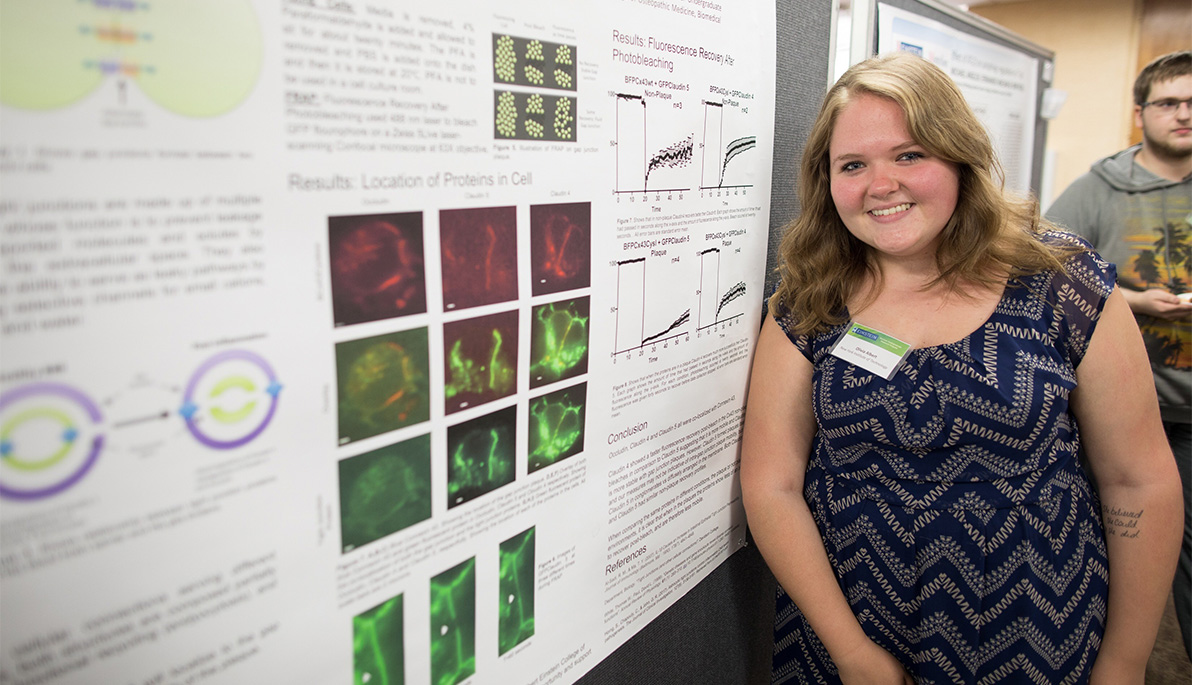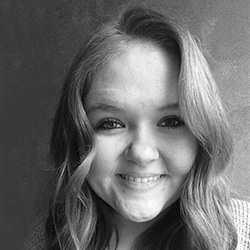
Alumni Profile: Olivia Albert

Degree: B.S. ’19
Major: Biotechnology
Current Role: Ph.D. Candidate, Albert Einstein School of Medicine
Research Scientist in Training
When Olivia Albert (B.S. ’19) chose to attend New York Tech to study biotechnology, she knew she would get the research experience she desired. What surprised her, was the number of opportunities available.
When [I began] searching for colleges, New York Tech spoke highly about how they had great opportunities for research experiences,” says Albert. “They did not let me down! I never imagined I would be lucky enough to have this much research experience [before applying to] graduate school.”
She is now second year Ph.D. student at Albert Einstein College of Medicine. Albert sat down with The Box to talk about what drew her to biotechnology and the research studies she is working on.
Why did you choose New York Tech?
It was one of the few local schools that offered biotechnology, [plus] I always wanted to live in New York City. I ended up transferring to the Long Island campus in order to do research.
What made you choose biotechnology?
I got my associates degree in liberal arts because I couldn’t decide between a degree in journalism or some sort of degree in science. During my sophomore year in college, I was diagnosed with thyroid cancer and immediately knew that writing could help me cope with the things I was going through. At the same time, I knew biotechnology was something I could utilize in order to try and help other people who were going through similar situations.
What excited me most about biotechnology are the opportunities! Technology is changing every day, which leads to so many possibilities for the future of science. Just from my classes, I find myself constantly in awe of today’s incredible technology and how it is being used by scientists and doctors. I can’t wait to be an active member in the field and really make a difference.
You are now a graduate student at Albert Einstein School of Medicine. What are you studying?
I am studying in the lab of Dr. Cristina Montagna in the Department of Genetics. I am using techniques such as fluorescent in situ hybridization (FISH), whole genome sequencing (WGS), and cell culture to study an aggressive form of brain cancer known as glioblastoma multiforme. The project I am working on is essentially looking at the relationship of age-related genomic instability and disease using glioblastoma multiforme as a model.
How has your New York Tech career prepared you for these projects?
The first year of my Ph.D. consisted of classes and laboratory rotations. Many of the classes I had taken at New York Tech left me well-prepared for the courses here at Einstein and gave me the general science knowledge I needed to be able to interact in discussions and poster sessions/talks. I learned the basic bench techniques needed for lab work and was able to fit right in during my laboratory rotations and learn more advanced techniques as a result. I think New York Tech, and the biotechnology program specifically, pushed me to be a well-rounded, motivated, and eager scientist, which made the transition into my Ph.D. a little bit easier.
Can you talk about some of the research you worked on as an undergraduate student?
I’m also lucky enough to have worked in the labs of two faculty members. In my junior year, I worked with Assistant Professor Randy Stout, Ph.D., in NYIT College of Osteopathic Medicine. I analyzed images of z-stacks of neuro 2A cells that showed endocytosis between oligodendrocytes and astrocytes. The goal of this project was to learn more about the directionality of endocytosis [a process in which substances are brought into the cell] and how mutations in specific regions of the amino acid sequence could affect endocytosis.
I also worked with Assistant Professor Bryan Gibb, Ph.D., in NYIT College of Arts and Sciences. In Dr. Gibb’s lab my project focused on the ever-growing resistance to bacteria and what we might do in order to try and combat it. I used kitchen sponges in order to isolate bacteria and, in turn, its corresponding bacteriophage [a virus that naturally infect bacteria] in order to try and understand their relationship and the actual strength bacteriophages have in combating these kinds of illnesses.
Now that you have gained some added experience in the field, what would you like current biotechnology students to know?
Something all current biotechnology students should know is that having a mentor that you can go to for help with classes, general science, and the grad school application and interview process is absolutely crucial. I still keep in touch with my mentor today and having them to talk to even still is so helpful. Having a great mentor at New York Tech gave me insight into the kind of mentor I needed for my Ph.D. thesis work and made finding the right lab and mentor less intimidating.









